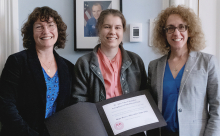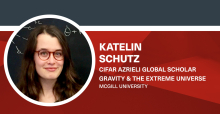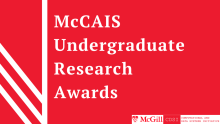As the climate warms, many species are on the move, raising new challenges for policy-makers around the world. Shifts in the ranges of mosquitoes and disease-bearing ticks and bats are introducing illnesses such as malaria and Lyme disease into regions where health-care systems are unprepared. Movements of commercially important fish from one jurisdiction to another are shifting job opportunities and causing trade disputes.


With generative AI tools readily available to students, student assessment was a recurrent topic of discussion at a bilingual, two-day symposium hosted by McGill last month in partnership with Google and the Pôle interordres de Montréal.

McGill awarded $10.9 million in federal funding through Canada Research Chairs Program

Allie Vibert Douglas made history when she earned her PhD at McGill.
It was 1926 – a time when higher education wasn’t an option for most women.
By then, Douglas already had a Bachelor of Arts and a Master of Science from McGill – and had been named a member of the Order of the British Empire for her wartime service. With her PhD, she became the first Canadian woman to obtain a doctorate in astrophysics.

Congratulations to Professor Nigel Roulet, Department of Geography, for being awarded the 2024 David Thomson Award for Graduate Supervision and Teaching!
This award recognizes an outstanding faculty member who has been supervising graduate students for more than ten years. Roulet started as an Associate Professor in the Department of Geography in 1994 and began his term as Graduate Program Director of the department the following year.
Congratulations to Professor Axel Hundemer, Department of Mathematics and Statistics, for being awarded the 2024 Leo Yaffe Award for Excellence in Teaching! This award is given each year to recognize a faculty member for superior teaching at the undergraduate level in the Faculty of Science.
Read below the citation for the announcement of the award.

Twenty McGill doctoral and postdoctoral students have received important funding from the Government of Canada. Sixteen have earned Vanier Canada Graduate Scholarships and four, Banting Postdoctoral Fellowships.
The Vanier program awards doctoral students up to $50,000 per year for three years. The Banting program is worth up to $70,000 annually for two years.
Professor Christian Genest is one of the three recipients of the 2024 Lise Manchester Award from The Statistical Society of Canada (SSC).
The award recognizes excellence in state-of-the-art statistical work which considers problems of public interest and which is potentially useful for formation of Canadian public policy.

Dr. Frederic Bertley (BSc’94, PhD’00), who received an honorary doctorate at the McGill Science convocation this past Friday, is featured in a new Global News article about his life growing up in Montréal and career as a doctor and science communicator. Known affectionately as “Dr. B.,” Dr. Bertley has won eight Emmy awards and is president and CEO of the Center of Science and Industry (COSI) in Columbus, Ohio.

Professor Katelin Schutz of the Department of Physics has been named a 2024-2026 CIFAR Azrieli Global Scholar in the Gravity & the Extreme Universe program.

Professor Gregory Dudek of the School of Computer Science has received the 2024 CS-Can Lifetime Achievement Award.
Awarded annually by Computer Science Canada/Informatique Canada (CS-Can/Info-Can), this award recognizes current or former faculty who have made exceptional contributions to the field of computer science in Canada.

Michelle Maillet (Academic Associate), Lauren Kay (Clerical), Chantal Marotte (Management), and Moshe Dalva (Technical) have been named recipients of the Faculty of Science Excellence Awards.
These awards, announced at the Faculty of Science Council meeting on May 21st, recognize the outstanding contributions made by members of the Faculty’s administrative and support staff during the 2023-2024 academic year.
Read below the citations prepared by the Faculty of Science Excellence Awards Committee.

Every year in Kahnawà:ke, a Kanien:keha’ka community on Montreal’s South Shore, students present their projects at a science fair organized by the Kahnawà:ke Education Center (KEC).
For more than 15 years, KEC Science Curriculum Consultant Kathy Walsh has supported students at schools across the community as they prepare projects in the weeks leading up to the annual fair. This year, she and KEC Science Projects Liaison Mya Bordeau enlisted the assistance of McGill’s Office of Science Outreach to bring McGill students into the classroom as mentors.


Today, the Natural Sciences and Engineering Research Council of Canada (NSERC) announced more than $26 million in funding for 16 new training initiatives through its Collaborative Research and Training Experience (CREATE) program.
